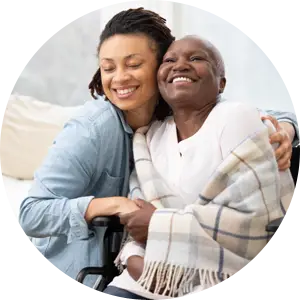CONTACT US
Whatever the nature of your enquiry, our friendly and approachable team are here to help you. Simply complete the online form below or call us on: 0808 239 1525 and one of our expert care advisors will provide you with all the information and guidance you need.
Depression in the elderly
Depression can sometimes become a problem for elderly people, and it can be caused by loneliness, isolation, lack of mobility and other…
Patient first STAR awards 2016
Patient First STAR Awards 2016 Sponsored by Comfort Keepers
On June 23rd Comfort Keepers were proud headline sponsors of the STAR Awards alongside the Love Your Hospital charity; this is an evening celebrating and recognising the hard working local carers and hospital staff members and their commitment to their patients.
The awards night for the Western Sussex Hospitals NHS FoundationTrust is dedicated to the hospital staff members in the West Sussex region, including St Richard’s Hospital, Southlands Hospital and Worthing Hospital. The event helps to bring to light the countless hours of care and attention the various hospital teams provide for their clients. It’s an excellent opportunity to thank members of staffs who truly deserve recognition and praise for their dedication and efforts.
Comfort Keepers was also the sponsor for the Compassionate Care Award. Compassion is at the heart of its home care services for older people and it was an honour to be able to present the award on behalf of the NHS Trust.
We congratulate all award nominees and winners for going the extra mile to help those individuals in need of help and support.
Comfort Keepers’ Darren Housden commented on the opportunity to be a part of this local hospital event:
“I am delighted that Comfort Keepers have been selected to be the headline sponsor for the 2016 STAR Awards Ceremony – to be part of such a fantastic event around so many dedicated people is a privilege. As an Organisation working within the local Care Sector we are fully aware of the challenges frontline staff can face on a daily basis and we congratulate all Award nominees and winners for going the extra mile to help those individuals in need of help and support”
Social care in post-Brexit Britain
The surprise result of the UK’s European Union (EU) referendum has created many questions about the future of our relationship with the EU and its economic prospects as a result. Business and political leaders working in the social care sector – which was already facing significant challenges before the referendum – need to rally together to avoid the fallout and capitalise on the opportunities that might arise from a new working relationship with the EU and wider afield….
Wills for the elderly
Wills for the elderly: What you need to know
Having a will is important at any age, especially if you have a large estate. But it becomes even more important as you age. Despite this, it is one of those things that people end up putting off. As a result, many elderly people realise that they don’t have a will in place for when their time comes.
This can lead to panic and stress, so it makes sense to write a will as early as possible. Here’s what you need to know to help your elderly relative sort out a will.
What happens without a will?
If your elderly relative dies without leaving a will, their estate will become what’s called ‘intestate‘. The ‘Rules of Intestacy’ take effect, and the estate will then be distributed according to the law. The estate is unlikely to be distributed as your elderly relative wishes, which can cause a lot of problems.
Consult a solicitor
The first thing you will want to do is consult an experienced solicitor, especially one who specialises in legal services for the elderly. Your elderly relative may not know where to start, and this is where you can help.
Ask around the local area. Talk to their elderly friends, and relatives of those friends, because a good recommendation is often the best way to go.
If you cannot find a recommendation, use the internet. The benefit of the internet is that you can read independent reviews of different solicitors, and this can provide you with more information to go on, rather than just choosing the nearest solicitor or plucking one from the Yellow Pages.
What should a will include?
An experienced solicitor will advise you on everything that needs to go into the will. However, in general, it will include everything that is included in your relative’s estate, including property, investments, savings, etc.
It will also state how these assets should be divided amongst certain people or charities.
This is a will at its most basic, but it should also contain details on what happens if the beneficiaries die before your relative dies, and whether you want to be cremated or buried.
And, importantly, the will should determine an executor. This is the person who will make sure your relative’s desires are met and who will deal with tax issues, such as inheritance tax.
Doing this with proper legal assistance is essential, otherwise it can lead to confusion and mistakes. Having a solid will in place will give your relative peace of mind, so always make sure you find an experienced solicitor to help.
Check the will regularly
Writing the will is the first and most important step, but you should also encourage your elderly relative to check it once a year or so, especially if their circumstances change. Amendments can easily be made to the original will, so reviewing it regularly is a good idea, and you can help them if necessary.
Such changes could include marriage, divorce, the death of a beneficiary, the purchase or sale of property, a large purchase like a new car, etc.
Lasting powers of attorney
Lasting Powers of Attorney (LPA) is another important issue to consider. This is an important area, and it essentially allows your relative to appoint people who they trust to make decisions in their place regarding health, finances, property and welfare should they be unable to make such decisions due to mental or physical difficulties.
Useful resources:
Tips for better sleep
How the elderly can get a better night’s sleep
Sleeping can often cause difficulties for elderly people. Regular waking through the night, aches and pains and insomnia can all be problematic, and these can lead to exhaustion during the day – which can make everyday activities a struggle.
So how can you help your elderly relative to sleep better through the night?
Changes in sleep as we age
Sleep patterns change as we age. The older we get, the lighter our sleep tends to get, which is a natural occurrence. Less deep sleep means there is a greater tendency to wake briefly during the night on multiple occasions, and elderly people will often go to bed earlier and wake up earlier.
In addition to this, many elderly people may also suffer problems that prevent them from sleeping well:
- arthritis can cause pain that prevents restful sleep
- they may need to urinate more frequently during the night
- some medications can affect sleep
- stress due to moving home or the loss of friends and family can also affect sleep
These are often not genuine sleep disorders, but they can certainly have an effect on sleep.
However, sometimes more serious sleep disorders can cause problems. These include sleep apnoea, where breathing temporarily stops, periodic limb movements in sleep (PLMS), and restless leg syndrome.
Changes you can make to the daily routine
As long as there is no specific sleep disorder, there are often many simple changes that a person can make to their daily routine to get a better night’s sleep. You could help your elderly relative to incorporate these into their lifestyle. Some of these include:
- Stick to a regular bedtime and waking time. This helps to get into a routine, which can improve the quality of sleep.
- Have pre-sleep rituals such as taking a bath or reading a book to prepare for sleep each night.
- Exercise during the day. We’ve written on exercise for the elderly before, and this is one of the best ways to get a better night’s sleep. Physical exercise tires you out more, but exercise is best carried out earlier in the day rather than during the few hours preceding sleep.
- Avoid substances that affect sleep. This may involve cutting down on caffeine, smoking and alcohol.
- Try to avoid longer daytime naps. Many people enjoy their long naps, but if their night time sleep is affected, it may be better to cut the nap to about 30 minutes or less.
- Get out and about. Going for a walk, doing some gardening and getting lots of daylight can help to improve sleep.
- The sleep environment itself may be a problem. Make sure the bedroom is a comfortable temperature and not too warm, and ensure it is dark and peaceful. A good quality mattress should also be used to provide enough support.
- Mental stimulation during the day can help with sleep. This could include a hobby, doing the crossword, jigsaw puzzles, Sudoku, reading or anything else they enjoy doing.
See a doctor if the problem is more serious
Sometimes a trip to the doctor is in order. For example, you may suspect that a medication your relative is taking is causing them sleep problems. Or there may be a more serious health condition that needs to be checked.
If you are worried, encourage a trip to the doctor. They may want to carry out some further tests, or they might provide some recommendations for changing sleep habits.
Useful Resources:
Food safety for the elderly: what you need to know
Correct food preparation is important for people of any age, but it is even more important for elderly people. Food poisoning can…
Are you a carer?
There are more informal carers across the UK than you think; Are you a carer?
Today there are approximately 7 million unpaid, or ‘informal carers’ in the UK looking after sick, disabled or older people – more than 1 in 10. These are everyday people who take on the unpaid responsibility of caring for a family member or friend and the numbers are rising.
Some key facts about informal carers are…
- There are around seven million carers in the UK – that is one in ten people. This is rising.
- Three in five people will be carers at some point in their lives in the UK.
- Out of the UK’s carers, 42% of carers are men and 58% are women.
- The economic value of the contribution made by carers in the UK is £132bn a year.
- By 2030, the number of carers will increase by 3.4 million (around 60%).
Young carers across the UK
- 13,000 of the UK’s young carers care for over 50 hours a week.
- Following a survey in 2010, the BBC estimated that there are 700,000 young carers in the UK.
- 68% of young carers are bullied in schools.
- Over 39% of young carers had not informed their teacher or any member of staff that they were young carer.
- 27% of young carers (aged 11–15) miss school or experience educational difficulties.
Older carers
- One in five people aged 50–64 are carers in the UK.
- 65% of older carers (aged 60–94) have long-term health problems or a disability themselves.
- 8% of older carers say that being a carer hurts their mental health.
- One-third of older carers say they have cancelled treatment or an operation for themselves because of their caring responsibilities.
Carers caring for someone with dementia
- There are currently 800,000 people living in the UK with dementia.
- There are 670,000 unpaid carers of people with dementia in the UK.
- Two-thirds of people with dementia live at home and most are supported by unpaid carers.
- Of all the UK’s carers, 11% care for people with dementia.
Caring and getting and keeping a job
- There are 4.27 million carers of working age living in the UK; 2.44 million (57%) of these are women and 1.83 million (43%) are men.
- The employment rate for carers is at 67% (72% of men and 62% of women); over half of those who are not working say that they want to do so.
- Nearly one in eight workers is a carer.
- One in five carers gives up employment to care.
How caring affects personal finances
- In a survey, 53% of carers have borrowed money as a result of their caring role – 61% have borrowed from a friend or relative and 41% have used overdrafts.
- 60% have used all of their savings to cover the costs of caring.
- 23% have either re-mortgaged their home or downsized to a smaller property.
Claiming benefits and caring
- In a survey, 8% of carers were receiving Disability Living Allowance as a result of their disability or ill health.
- 35% of carers had missed out on state benefits because they didn’t realise they could claim them.
- Out of the carers surveyed, 9% had missed out on Carer’s Allowance for 3–5 years, 10% for 5–10 years and 14% for over ten years, because they did not realise they were entitled to it.
Carers’ health and well-being
- In a survey, carers providing more than 50 hours of care per week are twice as likely to report ill health as those not providing care.
- Carers providing high levels of care were associated with a 23% higher risk of stroke.
- 17% of carers who had taken a break of more than a few hours experienced mental ill-health compared to 36% of carers who did not have such a break since beginning their caring role.
Very often a home care service can provide not only care and support to the person in need but vital time away for the informal carer – even if this is just a few hours per week, this time enables the carer to re-energise and take a break from the stresses and strains of looking after their loved one thus maintaining a person’s sanity and health. The worst case scenario is when the informal carer’s health breaks down and they are admitted to hospital. This can then lead to the cared-for person being admitted to hospital because there is no one around to look after them, a situation which can be entirely preventable by using external Care Workers who can come in at times to suit and provide that much-needed support to both parties.






